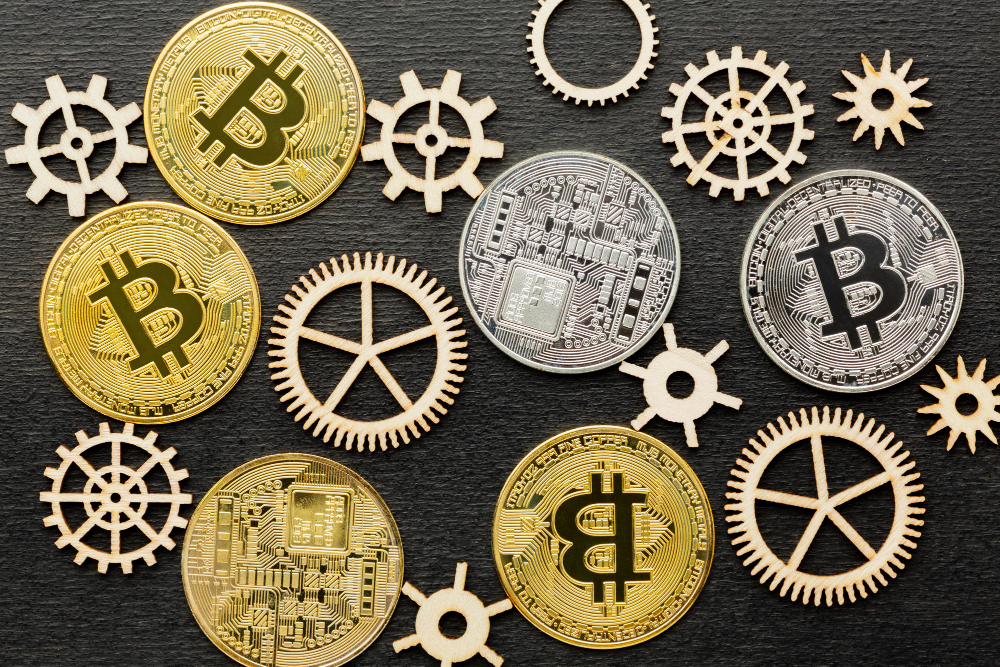
Introduction: What is Bitcoin?
Bitcoin (BTC) is a decentralized digital currency introduced in 2008 by an anonymous entity known as Satoshi Nakamoto. It operates on a peer-to-peer network, allowing transactions without the involvement of intermediaries like banks or governments. Bitcoin uses blockchain technology to maintain a secure, public ledger of all transactions.
Key Characteristics:
Decentralized: No central authority controls Bitcoin. Finite Supply: Only 21 million bitcoins will ever exist, making it a deflationary asset. Transparency and Immutability: Every transaction is publicly recorded and cannot be altered. —
History of Bitcoin
-
- 2008 – The Genesis of Bitcoin
Satoshi Nakamoto published the white paper titled “Bitcoin: A Peer-to-Peer Electronic Cash System,” explaining the concept of a ecentralized digital currency. - 2009 – Launch of the Bitcoin Network
The first block, known as the Genesis Block (Block 0), was mined by Nakamoto on January 3, The first Bitcoin transaction occurred between Nakamoto and developer Hal Finney. - 2010 – First Real-World Use
In May 2010, Laszlo Hanyecz made the first documented purchase with Bitcoin, buying two pizzas for 10,000 BTC—now celebrated as Bitcoin Pizza Day. - 2013 – Bitcoin Gains Media Attention
Bitcoin crossed the $1,000 mark, sparking widespread media coverage and attracting institutional interest. - 2017 – Bitcoin Boom and Fork
Bitcoin’s price surged to nearly $20,000, and a major fork created Bitcoin Cash (BCH). - 2021 – Institutional Adoption
Major companies like Tesla and PayPal adopted Bitcoin for payments, driving its price above
$60,000. - 2022-2023 – Market Volatility and Regulatory Scrutiny
Bitcoin faced a significant market correction while regulators across the globe sought to establish control over crypto markets. —
Is Bitcoin a Real Currency or a Scam?
Bitcoin is a legitimate digital currency that fulfills some functions of traditional money but lacks widespread use as a unit of account.
Bitcoin as a Real Currency Medium of Exchange: Bitcoin can be used to purchase goods and services in many countries.
Store of Value: Many view Bitcoin as “digital gold,” using it as a hedge against inflation.
Misconceptions and Scams Not a Scam: Bitcoin itself is not a scam, but scammers often exploit its popularity for fraudulent schemes.
Common Scams: Ponzi schemes, phishing attacks, and fake exchanges tarnish Bitcoin’s reputation.
Twitter Insight:
“Bitcoin is not a scam, but there are plenty of scams within the crypto space. Understanding the difference is key.” – @naval (Naval avikant) —
Countries That Have Legalized Bitcoin Legal Tender Countries- El Salvador – Became the first country to adopt Bitcoin as legal tender in September 2021.
- Central African Republic (CAR) – Followed suit in April 2022, making Bitcoin an official currency.
Countries Allowing Bitcoin Transactions:
Countries that allow Bitcoin transactions but do not recognize it as legal tender include:
United States, Canada, Japan, Germany, United Kingdom, Australia, Singapore, South Korea, India (Regulated but not fully legalized)
Countries Restricting or Banning Bitcoin:
Banned: China, Bangladesh, Nepal, Morocco, and Bolivia.
Restricted: India, Turkey, and Russia impose strict regulations but allow limited crypto activities.
- 2008 – The Genesis of Bitcoin
Twitter Insight:
-
-
- “El Salvador’s decision to legalize Bitcoin as legal tender was a bold move that could reshape global finance.” – @nayibbukele (Nayib Bukele, President of El Salvador) —
Challenges to Legalizing Bitcoin as a Currency - Price Volatility
Bitcoin’s extreme price fluctuations make it an unreliable medium of exchange.
Merchants are hesitant to accept payments in Bitcoin due to its unpredictable value. - Regulatory and Legal Concerns
Governments face challenges in regulating Bitcoin due to its decentralized nature. Concerns about money laundering, tax evasion, and illicit activities deter many nations from legalizing it. - Lack of Consumer Protection
Bitcoin transactions are irreversible, and victims of fraud have little recourse. - Scalability Issues
Bitcoin’s network can handle only about 7 transactions per second, making it impractical forlarge-scale adoption. - Environmental Concerns
Bitcoin’s proof-of-work (PoW) mechanism consumes vast amounts of energy, leading to criticism over its environmental impact. - Cybersecurity Threats
Hacking, phishing, and ransomware attacks create security risks for Bitcoin users. - Threat to Central Banks
If Bitcoin were widely adopted, it could undermine the authority of central banks and destabilize traditional financial systems.
Twitter Insight:
“Bitcoin’s biggest challenge is scalability and environmental impact. Without solving these, mass adoption may be difficult.” – @VitalikButerin (Ethereum Founder)
- “El Salvador’s decision to legalize Bitcoin as legal tender was a bold move that could reshape global finance.” – @nayibbukele (Nayib Bukele, President of El Salvador) —
-
Future of Bitcoin: Opportunities and Risks
-
-
- Increased Institutional Adoption More financial institutions are adding Bitcoin to their balance sheets as a hedge against inflation.
- Mainstream Usage as Digital Gold Bitcoin is increasingly seen as a store of value and an alternative to gold.
- Layer-2 Solutions Technologies like the Lightning Network aim to enhance Bitcoin’s scalability and enable faster, low-cost transactions.
- Potential for Regulatory Clarity Clear regulations could bring stability, attracting more institutional investors.
- Global Economic Impact Bitcoin adoption may rise in countries with weak financial systems and unstable currencies. —
Conclusion: Bitcoin’s Road Ahead Bitcoin has come a long way since its inception in 2009. While its legitimacy as a digital asset is no longer questioned, challenges such as price volatility, regulatory concerns, and environmental impact remain. As more countries and institutions embrace Bitcoin, its role in the global financial system will continue to evolve. However, whether Bitcoin will become a universally accepted currency or remain a niche asset remains uncertain.
Twitter Insight:
“Bitcoin is here to stay, but the path to global acceptance will not be smooth. Expect hurdles, but also expect innovation.” – @APompliano Anthony Pompliano, Bitcoin advocate)
-




